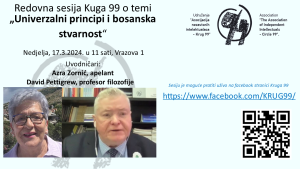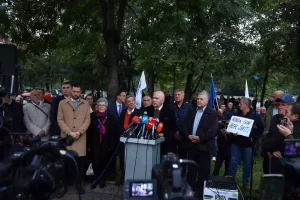CIVIC GOVERNANCE AS A HISTORIC IMPERATIVE FOR BOSNIA AND THE NATURAL RIGHT OF A MODERN NATION STATE

| Krug 99 (Circle 99) Summary of Session of 24 September 2022 – 18 CIVIC GOVERNANCE AS A HISTORIC IMPERATIVE FOR BOSNIA AND THE NATURAL RIGHT OF A MODERN NATION STATE The Bosnian nation state defines the historical, legal and cultural identity of Bosnia and Herzegovina. Bosnia became an internationally recognized nation state when its citizens expressed their preference for independence through a referendum. However, wartime events brought terrible criminal activities, ethnic cleansing and genocide. All of this gave birth to the “Dayton Peace Agreement,” which brought peace, but which also imposed a constitution that featured discrimination, segregation and ethnic divisions, as well as an abandonment of basic human rights and the rights of citizens. The approved Constitution of Bosnia and Herzegovina stands in contrast to the earlier Republic constitutionality and the civic concept of societal organization for which the citizens of Bosnia and Herzegovina had already voted. The provisions of the Dayton agreement identified ethnic communities as the basis of a functioning political system. The agreement vested actual political power in these communities, which undermined all democratic and legal standards and these communities then presented themselves as the sole legitimate representatives and protectors of ethnic interests. This kind of Constitution of Bosnia and Herzegovina has prevented Bosnia from becoming a modern democratic state based on universal democratic values in which citizens would be able to enjoy their inalienable rights and to publicly express a pluralism of identities within the context of a nation state. The civic concept of governance has become a political dynamic in opposition to every form of political and legal discrimination. But lacking defined constitutional power, this is rejected and negated by domestic politicians, as well as neighboring political power centers. It is deployed in political rhetoric and propaganda in order to evoke fear and achieve the homogenization of ethnicity. Moreover, it is described as an attempt by the numerically strongest nation in Bosnia to achieve supremacy and domination. The current system is obviously discriminatory through the fact that currently a majority of citizens cannot fulfill their fundamental voting rights because of provisions of the “Electoral Law of Bosnia and Herzegovina.” Those provisions are in complete opposition to the “European Convention for the Protection of Human Rights” and the findings of the “European Court of Human Rights.” These European institutions clearly called for the establishing of a political system that would enable all citizens of Bosnia to exercise their active and passive electoral rights at all levels of authority. They also excluded discrimination on the basis of ethnic affiliation and the granting of special rights to so-called “constituent nations.” Implementation of the court findings would mean replacing the exclusivity of “constituency” with the inclusivity of the category of “citizens” in the electoral process. In principle, this would require the establishment of a democratic constitutional system. In that system, the citizen would be the executor of sovereignty, the holder of active and passive electoral rights, a partner in the process of public decision-making and the maintainer of all democratic values. The domination of an ethno-political concept has been imposed in law. Because of this, it would be illusory to expect constitutional reforms and changes to the electoral law defending the equality of citizens to be achieved through normal institutional procedures. Because of limitations in the democratic capacities of the Bosnian state, the aspirations for a civic society are directed toward the intervention of the “High Representative” in Bosnia. Through the authority of his position and the powers vested in him by Dayton, he could undertake specific measures to correct the errors imposed through “constitutional anomalies,” which have become over time the basis of discrimination in the functioning of the electoral and political system of Bosnia and Herzegovina. The demand for changes moving toward a civic governance derives from a belief that natural rights are by their very character universal rights, both at the national and international levels. Moreover, these are the basis of domestic, national and state politics, as well as external, international and interstate politics. These are the foundations of domestic national and international political relations. The previous intentions of the High Representative in Bosnia to change the electoral law and the Constitution of the Federation of Bosnia and Herzegovina were based on political discrimination and not on achieving the equality of the value of votes. This is in contrast to democratic tradition and contemporary political practice in Western states. A fundamental consequence of this would be the continuing of ethnic territorialization of the Federation of Bosnia and Herzegovina. This could also result in the formation of a third ethnic entity in Bosnia. In this way, the international community would be strengthening ethnic divisions and uncertainty within the country, instead of moving Bosnia toward a peaceful and secure future on the basis of natural civic rights. For the present, the international community tolerates and supports the “Serbian world” and the “Croatian world” in Bosnia while at the same time fighting with all means in Ukraine, and rightly so, against the “Russian world.” Instead of strengthening a civic legal system in Bosnia and Herzegovina, it is supporting an ethnic-based system, turning ethnic differences into political inequalities. A legal state with civic inequalities on any basis whatsoever (status, class, ethnicity, nationality, ideology, race, etc.) has the power and intention through legislation and its constitution to empower some and to disenfranchise others, thus destroying the principle of natural civic equality. ** The presenter at this session was Prof. Dr. Enver Halilovic and Dr. Nermin Tursic Adil Kulenović, President |
| Association of Independent Intellectuals – Circle 99 (Bosnian: Krug 99), a leading Bosnian think-tank, was established in Sarajevo in 1993, in the midst of the Bosnian war (1992-1995), while the capital was under siege. Circle 99 provides a platform to bring together intellectuals of various professional and ethnic identities; university professors, members of the Academy of Sciences and Arts of Bosnia and Herzegovina, artists, journalists, entrepreneurs, diplomats, and other prominent figures from Bosnia and from abroad. Multidisciplinary discussions and initiatives are held each Sunday throughout the academic year, in the form of regular sessions about politics, science, education, culture, economy, and other societal issues. The overall goal is to sensitize the public towards a democratic transformation, achieving and maintaining peace, and integration of modern Bosnia into the community of countries fostering liberal democracy. Circle 99 has been declared an organization of special significance for the city of Sarajevo. |







